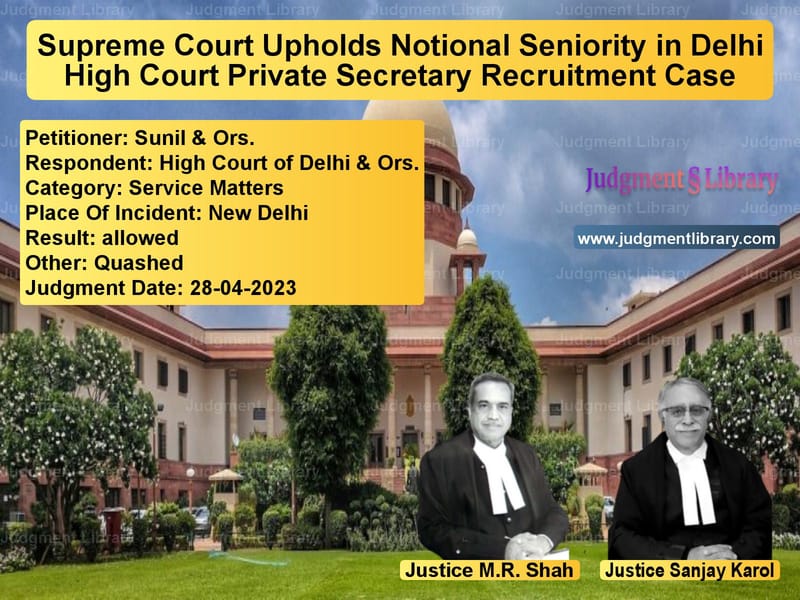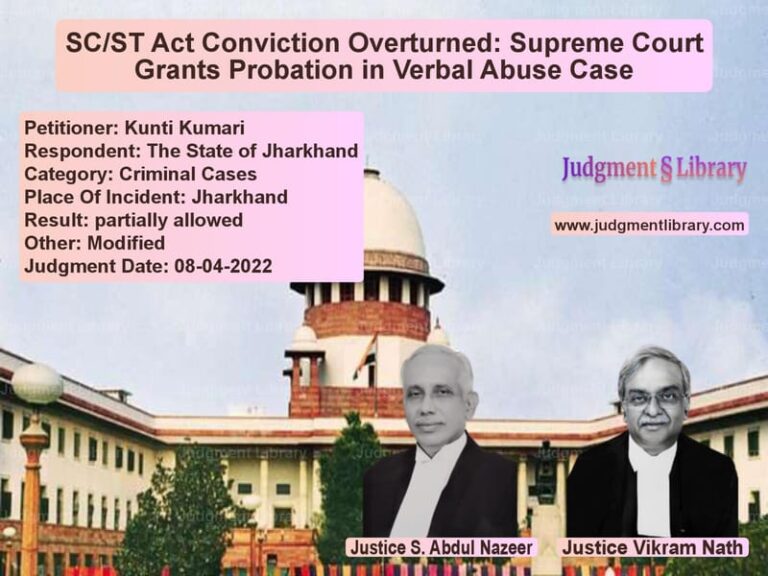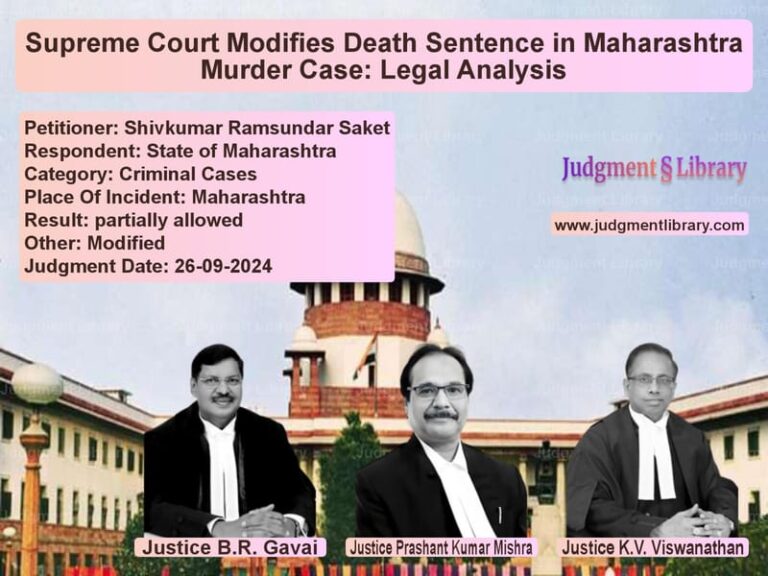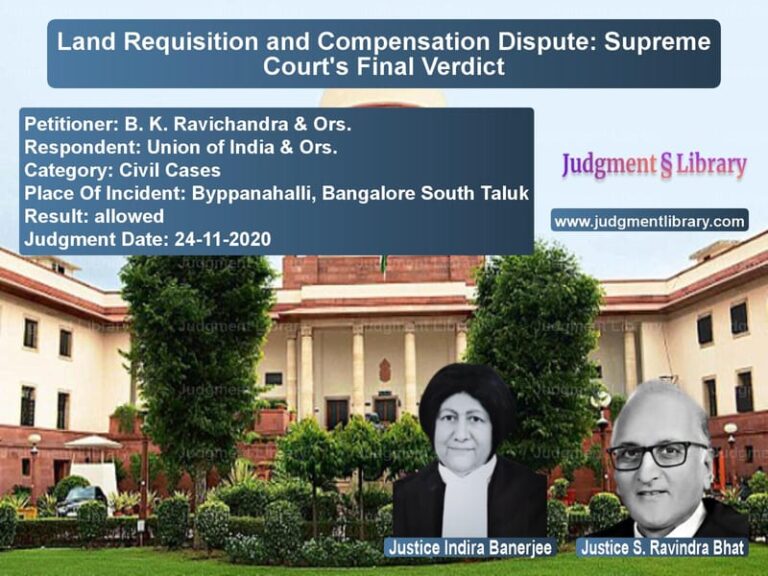Supreme Court Upholds Notional Seniority in Delhi High Court Private Secretary Recruitment Case
The Supreme Court of India, in the case of Sunil & Ors. vs. High Court of Delhi & Ors., addressed the issue of seniority in the recruitment of private secretaries for the Delhi High Court. The case revolved around whether candidates whose marks were increased upon re-evaluation were entitled to seniority based on their revised marks.
The Court ruled in favor of the appellants, restoring their notional seniority from the original appointment date. The judgment ensures that candidates who were unfairly excluded due to incorrect marking receive appropriate placement in the merit list, impacting their future career progression.
Background of the Case
The recruitment process began in 2016 to fill 27 vacancies for private secretaries in the Delhi High Court. The selection process included:
- A written examination on July 4, 2016.
- A skill and typing test on July 5, 2016.
- Interviews conducted on January 19 and 25, 2017.
The final merit list was published on January 30, 2017, and 27 candidates were appointed. However, some candidates sought re-evaluation of their answer sheets, claiming marking errors.
Key Legal Issues
1. Whether candidates whose marks increased upon re-evaluation were entitled to seniority as per their revised scores.
2. Whether candidates who did not initially seek re-evaluation could later claim similar benefits.
3. Whether procedural lapses in re-evaluation affected the validity of the revised merit list.
Arguments Presented
Petitioners (Sunil & Ors.) Arguments
- They were wrongfully excluded from the merit list due to marking errors.
- Upon re-evaluation, their marks were increased, entitling them to appointment and proper placement in the merit list.
- The Delhi High Court initially upheld their revised ranking, but the decision was overturned by a later ruling.
- It would be unfair to deny them seniority when their exclusion was due to the examiners’ mistake.
Respondents (Previously Appointed Candidates) Arguments
- The original merit list should remain unchanged since re-evaluation was conducted selectively.
- They were appointed based on the first merit list and should not lose their seniority.
- Re-evaluation benefited only some candidates, creating an unfair advantage.
- The recruitment rules did not provide for re-evaluation, making the process questionable.
Supreme Court’s Observations
The Supreme Court, led by Justices M.R. Shah and Sanjay Karol, made the following key observations:
- The original exclusion of some candidates due to incorrect marking was an error that needed correction.
- Re-evaluation was conducted officially, and its results could not be ignored.
- Since re-evaluated candidates were appointed with effect from January 30, 2017, they were entitled to notional seniority from that date.
- Once re-evaluation corrected an injustice, the affected candidates should not be placed at a disadvantage.
The Court stated:
“Non-grant of seniority based on revised marks would render the process of re-evaluation redundant.”
Final Judgment
The Supreme Court ruled as follows:
- The High Court’s decision overturning the revised merit list was quashed.
- The Special Committee’s decision to grant notional seniority based on revised marks was restored.
- The affected candidates were to be placed in the merit list in accordance with their revised marks.
Implications of the Judgment
The ruling has significant implications for future recruitment and selection processes:
- Ensuring Fair Play: Candidates affected by incorrect marking should not suffer career setbacks.
- Re-evaluation Rights: If re-evaluation is permitted, its results must be fully implemented.
- Judicial Clarity: Courts should prioritize merit and fairness over rigid procedural constraints.
Conclusion
The Supreme Court’s ruling in Sunil & Ors. vs. High Court of Delhi & Ors. upholds the principle that errors in competitive exams must be rectified completely, including adjustments to seniority. The judgment ensures that merit is fairly recognized and prevents administrative lapses from disadvantaging deserving candidates.
This decision serves as a crucial precedent for government recruitment processes, emphasizing that procedural corrections must reflect in final rankings.
Petitioner Name: Sunil & Ors..Respondent Name: High Court of Delhi & Ors..Judgment By: Justice M.R. Shah, Justice Sanjay Karol.Place Of Incident: New Delhi.Judgment Date: 28-04-2023.
Don’t miss out on the full details! Download the complete judgment in PDF format below and gain valuable insights instantly!
Download Judgment: sunil-&-ors.-vs-high-court-of-delhi-supreme-court-of-india-judgment-dated-28-04-2023.pdf
Directly Download Judgment: Directly download this Judgment
See all petitions in Recruitment Policies
See all petitions in Public Sector Employees
See all petitions in Promotion Cases
See all petitions in Judgment by Mukeshkumar Rasikbhai Shah
See all petitions in Judgment by Sanjay Karol
See all petitions in allowed
See all petitions in Quashed
See all petitions in supreme court of India judgments April 2023
See all petitions in 2023 judgments
See all posts in Service Matters Category
See all allowed petitions in Service Matters Category
See all Dismissed petitions in Service Matters Category
See all partially allowed petitions in Service Matters Category







